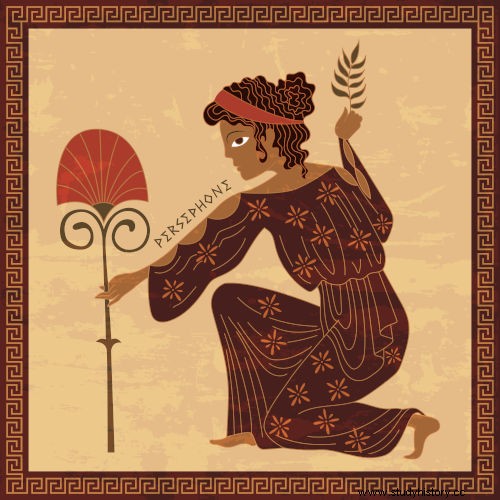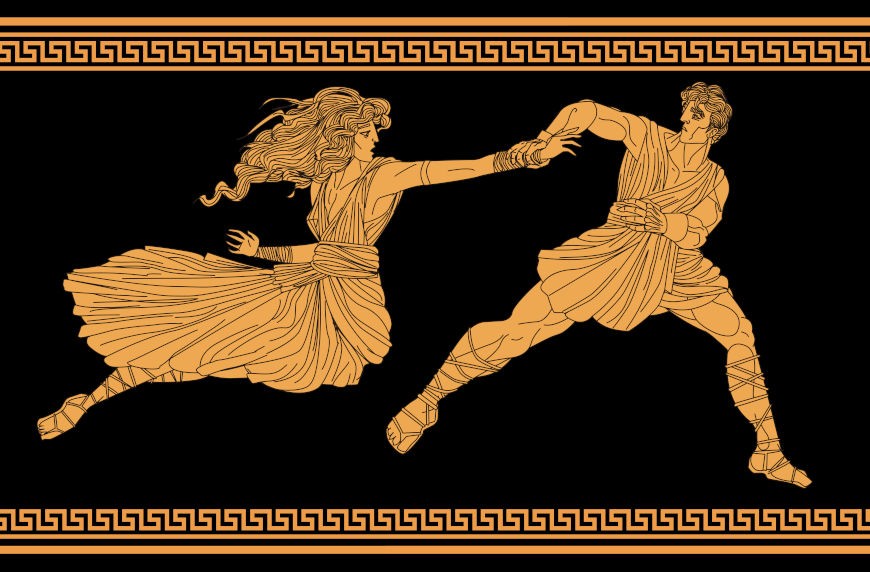
Deity that was part of Greek religiosity, Persephone was a goddess of agriculture and vegetation , responsible for fertility. She was the daughter of Demeter and Zeus and was kidnapped by Hades, god of the underworld. She was taken to the underworld and, after her mother's cries, stayed there only part of the year, with the remaining part mother and daughter spending together.
Learn more :The Myth of King Midas — the king with the gift of turning everything he touched to gold
Persephone Summary
-
Persephone was the goddess of agriculture and vegetation, responsible for the fertility of crops.
-
she was the daughter of Demeter and Zeus.
-
she was worshiped in an agrarian ritual known as the Eleusinian Mysteries.
-
she was kidnapped by Hades and taken by him to the underworld.
-
she spent part of the year with Hades and another part with Demeter.
Persephone's Story
Responsible for grain fertility and, consequently, for obtaining a good harvest, in Greek mythology Persephone was a deity recognized as the goddess of agriculture and vegetation. She wasDaughter of Zeus and Demeter , another deity who was also considered a goddess of agriculture and fertility.
The cult of Persephone among the ancient Greeks was strongly related to the search for the fertility of crops. This goddess was also identified with spring , period in which the flowering of a series of plants occurs.
Historians are not aware of when exactly the devotion to Persephone arose, but from her characteristics, it is known that the cult of her was related to rituals performed by ancient farming communities who settled in Greece. The unknown origins of this goddess and her cult probably contributed to her being known by other names, such as Kore, among the Greeks themselves, and Proserpine, among the Romans.
It is also important to mention that Persephone had another attribute among the Greeks:that of queen and goddess of the underworld , the place where humans who died went. This characteristic has to do with the abduction and marriage of this goddess with Hades, lord of this realm.
Login also :Greek gods — the deities that were part of the religion of Ancient Greece
Persephone in Greek Religiosity
Persephone's attributes and her relationship with the fertility of agriculture made this goddess a very important deity. A ritual to Persephone and Demeter was particularly known among the Greeks. These are the Mysteries of Eleusis, agrarian cult dedicated to goddess Persephone and her mother , which was a secret cult, therefore restricted to initiates.
This ritual was established in the city of Eleusis, located in Attica, region of Continental Greece. Subsequently, spread to other regions of influence of Greek culture , such as Sicily, an island south of the Italian Peninsula. Historians claim that this ritual may have originated during the Pre-Homeric Period, when Greece was inhabited by different peoples.
The Eleusinian Mysteries were held annually , and there are different theories that point to the origins of this cult. Some historians attribute the roots of this ritual to the Mycenaeans, while others attribute it to the Cretans. This cult of Persephone and Demeter was quite popular until around the 4th century, when Christianity gained strength in the Roman Empire.
Learn also :Plague of Athens — the epidemic that killed a third of the Athenian population
The Abduction of Persephone

The most significant event related to Persephone is the myth that narrates her abduction by Hades, god of the underworld. The events related to this abduction were part of the rituals of the Eleusinian Mysteries.
The myth begins with the fact that Hades leaves his realm to verify the battle that was being waged on Earth between the gods and giants. That's because Hades feared that this dispute would leave the underworld exposed to the sun's rays.
It happens that, during the journey, Hades ends up being hit in the heart by an arrow launched by Eros. The arrow would make Hades fall in love with someone, and eventually he crossed paths with Persephone while she was on a prairie picking flowers.
Hades, in love with Persephone, decided to kidnap á la and take her to the underworld in order to make her his wife. Some versions claim that the kidnapping took place with the permission of Zeus, the supreme god of Mount Olympus and father of Persephone.
-
Consequences of the abduction of Persephone
Demeter was desperate with her daughter missing . She searched for her daughter for days, until Hermes told her what had happened to Persephone. Deeply saddened by what happened, Demeter forgot her obligations and, with that, agriculture ceased to be fertile, and famine spread across the Earth.
The myth also narrates Demeter's journey to Eleusis. Heartbroken at the abduction of her daughter, the goddess sat on a rock and spent days crying. She was disguised as an old woman and ended up being approached by a man and his daughter, who invited her to have dinner at her residence, an invitation she accepted.
The man, named Celeus, was married to Metanira. The couple had a son who was seriously ill. Your hers son was called Demophon and ended up being healed by Demeter with a kiss from the goddess, still in disguise. Demeter began a ritual to make Demophon immortal, but was interrupted by Metanira.
With the interruption, she revealed herself and announced that by the interruption, a temple was to be built in her honor at Eleusis . The myth, therefore, ends up explaining how the cult of Demeter was established in this Greek city. However, she announced that Demophon would be a great man and would teach mankind the secrets of agriculture.
Finally, with the suffering on Earth caused by Demeter's grief and his insistence on rescuing her, Zeus was convinced asking Hades to release Persephone . Hermes was sent to talk to Hades, who announced that he would only return her if she hadn't consumed any underworld food. Persephone, in turn, had consumed pomegranate seeds.
Hades then made a deal:in one part of the year Persephone would be on underworld and on the other part, would be on T error with your mother . The time the goddess would spend with Hades varies according to the version of the legend. One version says she would spend a third of the year with Hades, and another version says half the year.
This myth ended up being interpreted as a mythological explanation of the Greeks for the seasons . Considering the case of Persephone spending half the year with Hades, we can see a correspondence with the seasons of autumn and winter, periods understood as the withering and shrinking of life. The flowering and rebirth would take place in the spring and summer, when Persephone was back with her mother.
